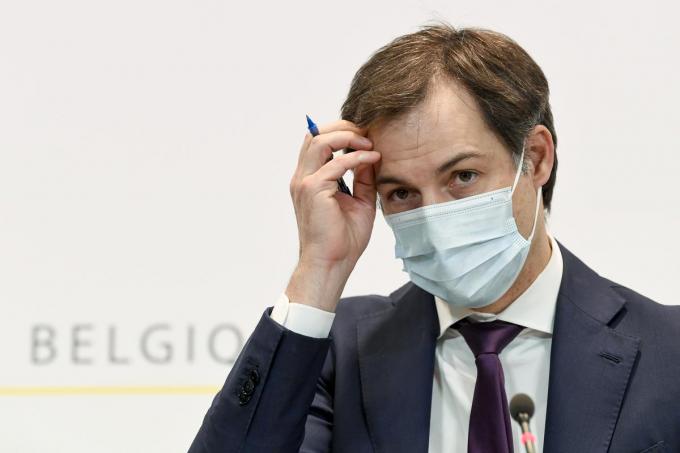Belgium is relaxing some coronavirus fighting measures and giving perspective to several sectors, Prime Minister Alexander De Croo announced during a press conference on Friday.
"Last week, we decided to take a time-out to see if the figures would continue to go up," De Croo said. "Luckily, the increase has slowed down now."
"We are more than ever aware of everyone's need for perspective, and therefore we have chosen to relax some measures that focus on the outside," he added. "By allowing more outdoors, we want to create more oxygen to sustain the measures."
"The agreement is that we will allow more outside, and adhere to the measures more inside," De Croo said. "Inside, the risk of infections is a lot higher."
"These announced relaxations will only continue if the vaccination campaign and the curves maintain the expected trends," he added.
From Monday 8 March, people's "outdoor bubble" will be increased from four people to ten, but the social distancing should still be practised and face masks should be worn. For indoor contacts, nothing changes. "For this, we are not only talking about gardens but also about public space, of course," De Croo clarified.
Funerals will also be able to take place with 50 people present.
From 15 March, day trips will be allowed again in primary and secondary education. For vulnerable groups, full-time education in person will be organised again, and there will be one day per school for contact education in higher education with a capacity of 20%.
Organised activities will be possible for children under 13 years old for up to 25 children outdoors, or a maximum of ten children indoors.
For the month of April, an 'outdoor plan' will be in force. It concerns sports activities, cultural events, amusement parks, youth camps, but always in a safe environment.
Organised outdoor activities, such as amateur sports training, will be possible with up to ten people again.
Cultural activities, events, and religious services with 50 attendees will be allowed again.
The amusement parks will be allowed to reopen, with strict safety protocols.
During the Easter holidays (Saturday 3 to Sunday 18 April), youth camps will be able to take place with up to 25 people under 19 years old. A testing strategy is being developed, focussing on the beginning and end of those camps.
The ban on non-essential travel will be extended until after the Easter holidays and will be lifted on 19 April. However, there will be an evaluation at the next Consultative Committee.
After the Easter holidays, primary and secondary school pupils should be able to physically attend classes again on a full-time basis.
Related News
- Bars and restaurants in Belgium could reopen on 1 May
- Cheat Sheet: Belgium's timeline for relaxing coronavirus measures
For the month of May, the government is also looking at more relaxations indoors, such as sports, youth, markets, culture, fitness, worship, and social contacts.
If all goes well, the hospitality sector will be able to open from 1 May, according to Flemish Minister-President Jan Jambon. Flanders will also increase its support measures for that sector.
"The Consultative Committee has asked the GEMS expert group to draw up an action plan for this. For that month, we will make massive use of testing," De Croo said, referring to rapid tests and self-tests.
"Relaxations also mean responsibility," he stressed. "If we all use these relaxations in the right way, we can take small steps towards the spring of freedom."
De Croo said that there is "no real exit plan" when underlining the importance of vaccination. "The exit plan is the vaccination campaign."
"We want to give young people in particular a perspective, but that also depends on the extent to which older people are vaccinated," said Federal Health Minister Frank Vandenbroucke.
"There are still a lot of practical problems we are working on, but the acceleration of the vaccination strategy has now started in all regions," he said. "I would also like to underline that we will maximise our ability to test people, not only to fight the disease but also to open up normal life again."
"Next week, for example, we will discuss the time period needed between the first and second dose of the Pfizer vaccine," Vandenbroucke said. "I think we can go to 35 days there, and that gives another opportunity to speed up."
The next Consultative Committee meeting will take place on Friday 26 March.
Maïthé Chini
The Brussels Times

